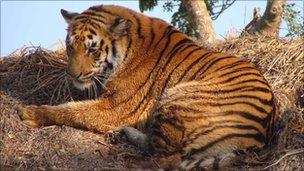Bangladesh plans special force to protect tigers
- Published

Sundarbans is home to about 400 tigers
Bangladesh is setting up a special force to save the critically endangered Royal Bengal Tiger and other animals.
The 300-member force will be deployed mostly around the Sundarbans mangrove forests, one of the last refuges of the tigers.
The decision came months after they seized three tiger skins and a large quantity of bones, the biggest haul of illegal tiger parts in decades.
The Sundarbans forests stretch between Bangladesh and India.
Around 400 tigers still live in the area.
Until now poaching has not been considered as the chief threat to the tiger population in Bangladesh.
But the arrest of a poacher with tiger skins and bones earlier this year raised fears that an organised poaching group was operating in the mangrove forests.
Officials admitted they did not have enough manpower, resources and training to counter the poachers, who they said were using increasingly sophisticated techniques to trap the tigers.
Minister of Environment and Forests Hasan Mahmud said that the setting up of the new wildlife force was long overdue.
"The forest department staff in Bangladesh need more training, because now the poachers are very sophisticated," he said.
"Their sophistication has been increased but the sophistication of the forest department has not been increased over the last couple of years. So, we have to train them and we have to equip them."
Most of the money to set up the new Wildlife Crime Control unit will come from the World Bank loan of $36m (£21.8m).
The new force will also tackle a growing trade in the illegal trafficking of wild animals.
Recently, officials seized a number of protected wild animals from people who were keeping them illegally.
Earlier this month, customs officers at Bangkok airport in Thailand found hundreds of freshwater turtles and crocodiles packed in suitcases on a flight from Bangladesh.
- Published1 October 2010
- Published14 September 2010